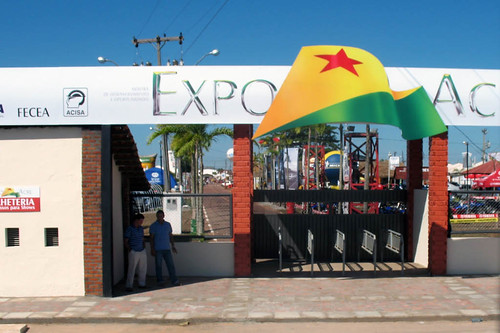
A few nights ago I went to the rodeo at ExpoAcre in Rio Branco, Brazil. Believe it or not, it was my first time at a rodeo. Brazil has been a curious experience for a backwoods no-TV-Luddite like me. I used my first cell phone here. I got introduced to the Internet and to digital culture here. And now on the Amazon frontier I am receiving a major dose of Americana.
Somehow, Acre State and the city of Rio Branco have always reminded me of Texas.
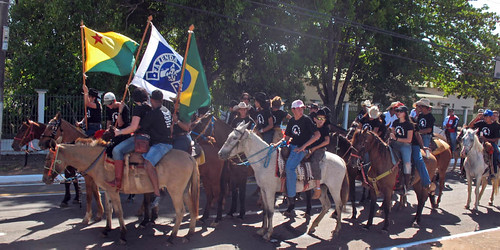
That’s what I got at ExpoAcre to the max. Lots of partying people, flowing beer, cowboy hats and baseball caps, fireworks, roaring 4x4 pick-ups, sound blasting country music mixed with disco and Brazilian beats presented DJ-style by a shouting MC who really knew how work the crowd in the packed arena.
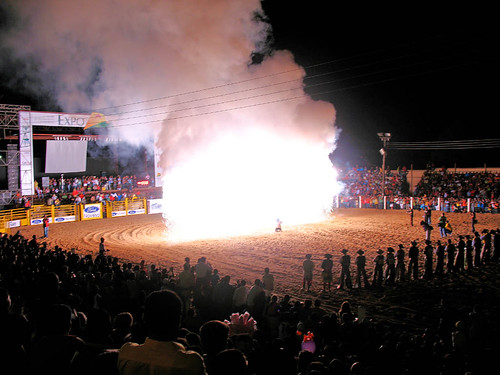
It was country-style Americana, straight from TV, now packaged for this medium size state capital city in Brazil’s western Amazon near the frontiers of Bolivia and Peru. Is this the “Wild West” of the 21st Century? My guide, a local resident, flashed a big enthusiastic smile and said, “Look at what we now have in Rio Branco!”
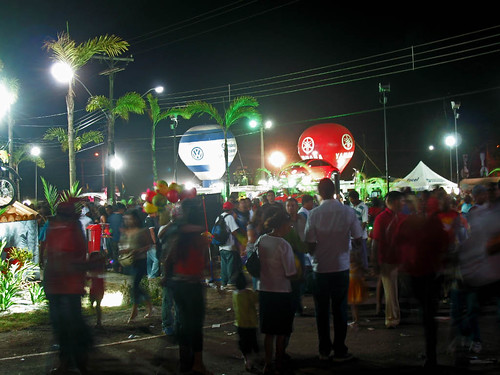
The enthusiasm of the crowd was both palpable and infectious. Despite my own “politically correct, eco-aware, anti-materialism, global citizen consciousness”, I found myself being carried along as if within the force of a powerful current. And, yes, I had fun -- lots of fun. There was an innocent joy about the whole thing, somehow familiar to me from my own experience as an adolescent coming of age in post World War II America.
During the 1950’s my family and my neighborhood in Chicago were emerging from the material deprivations of the depression and the war. We were soaring forth into an unbounded sense of progress as the vast technological capabilities and mass mobilizations developed during wartime were turned toward creating a peacetime economy of consumption. The seriousness of sacrifice was being replaced by the exuberance of shopping and the promise of more and more stuff. We were all teenagers.
Now, I was witnessing these forces in Acre,
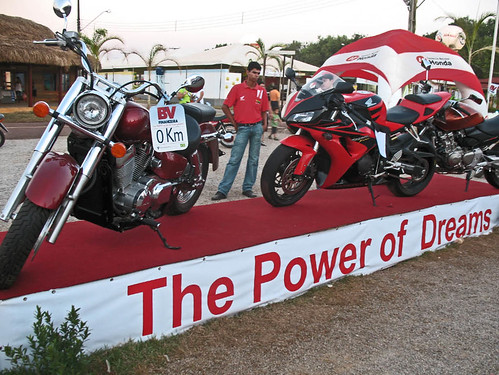
forces that also relentlessly eat forests.

I recalled the simple words of Brazil’s President Lula, a very practical politician who is very in touch with the hopes and aspirations of the common Brazilian -- “the 20 million people who live in the Amazon want TV and refrigerators too.”

Of course, it’s not limited to the Amazon. Perhaps half the world has been waiting for the opportunity to experience the American standard of material consumption. It’s easy to turn judgmental about all this -- too easy, I’m afraid. But it’s important to understand that consumerism is one of the powerful currents now running through the greatest river basin on earth and transforming its forest.
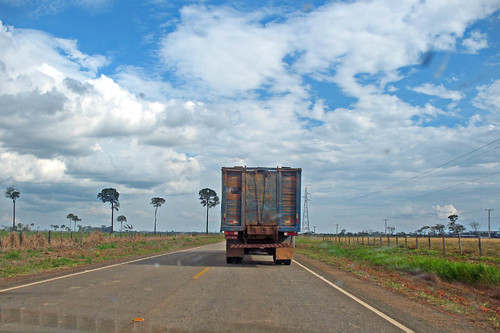
The next day I had the opportunity to discuss this with one of the main environmentalists in Acre. I told him of my memories of entering the brave new world of shopping and how familiar this all feels now in Acre. He agreed that stopping the urge to consume would be most difficult but then he added, “Lou, you experienced this in America fifty years ago when there was no awareness of the global consequences. But now we are in the time of global warming. The situation is urgent. We must find a way to halt the deforestation.” Of course, I agreed.
We discussed this at length. He told me of the cycle of the interconnections of burning the forest, illegal logging, ranching, new roads, soybeans, the spread of global agribusiness and now, ethanol. The main threat during the 70s and 80s had been the spread of beef production and ranching through previously forested areas. The forest was burned to clear the understory, log it for the valuable tropical hardwoods and open it for ranching. This is what had triggered the “peoples of the forest movement” lead by Chico Mendes.

As the movement gained international attention and support, and as Chico Mendes was martyred by murder in 1988, pressure was directed at Brazil’s national government which responded by creating many new protected areas -- parks and so-called extractive reserves where local people could engage in sustainable practices such as gathering latex or seeds or nuts which can be turned into a range of products. Additionally, many new environmental laws were enacted. And some very good things have begun to happen. For example, here in Acre the State government has introduced an innovative master plan of land-use zoning called the Sistema de Produção Sustentável (System of Sustainable Production).
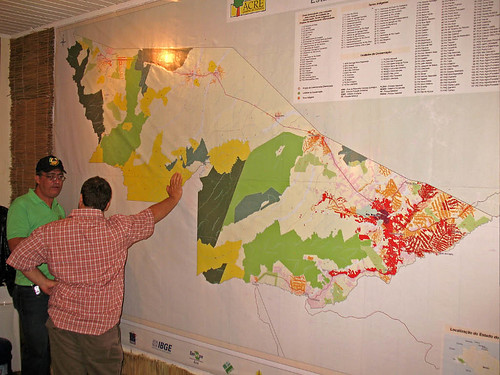
It looks pretty good -- on paper. But, the general pattern has been for the overall rate of Amazon deforestation to be governed more by global market demands for agricultural commodities -- and, now, biofuels -- than by environmental laws. Much is made of the fact that Brazil has vast areas of uncultivated land which are available for agricultural production without any new deforestation. But, a great deal of it is pasture land for Brazil’s vast herds of cattle. (Today, Brazil is the leading beef producer in the world.) As land is converted from pasture to row-crops, the forest frontier is pushed back -- burned, cleared and deforested to create areas for ranching.
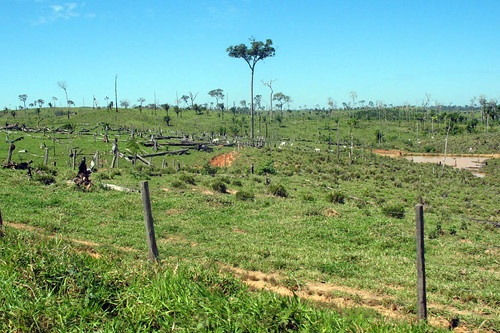
So far the most effective global constraint on the logging of tropical hardwoods worldwide has come through various green certification programs (largely in the European market) and the willingness of conscious consumers in the highly developed world to boycott uncertified products. But this has little impact in Brazil where it is approximated that 80 percent of the illegal logging goes into the domestic market to feed the appetites of an expanding urban -- and not particularly environmentally conscious -- middle-class that are acquiring modern homes, apartments and furnishings.
This sign on a building in central São Paulo seems iconic.

In Acre there are an increasing number of "value-added" wood products that are being produced according to sustainable forest practices

but it is not easy to compete with with the prices set by illegal logging and mass production.
Policing the vast Amazon frontier is an incredible challenge plagued by sheer scale, lack of funding and by corruption. The forest is nearly the size of western Europe. New methods of satellite pictures and Internet for monitoring by Indian tribes in remote areas have been introduced recently but it remains to be seen how effective this will be. For the moment, the domestic demand for wood-products and the global prices for beef, soy or ethanol seem to have more impact on deforestation rates than environmental regulation.
It is important to note that, although the Amazon is the global poster child, the incredible biodiversity of Brazil has so far been hit hardest in its second largest biome, the highland plateau or cerrado where more than 75% of the most diverse grassland on earth either has been replaced by the monocultures of industrial agriculture or seriously degraded by cattle grazing. But, today, it is probably global warming more than the loss of biodiversity that is placing the global spotlight on Brazil where burning (both for deforestation and for agriculture) has made it one of the top 10 greenhouse gas polluters in the world.
One sees the forces of globalization and development everywhere. A new ethanol plant has been built,
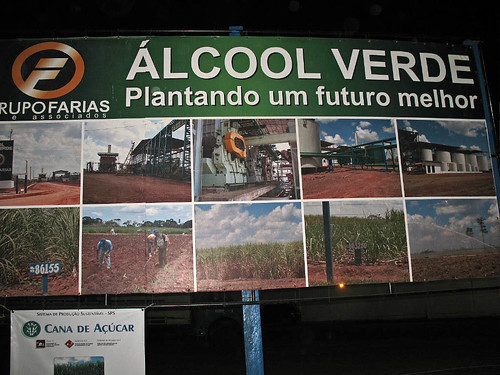
and the surrounding pasture land is being converted to monocultures of sugar cane.

A new bridge has been completed into Peru thus connecting the Brazil to the Pacific ports for the first time. The program of rural electrification is being completed and satellite dishes for TV and LAN Houses for Internet are appearing everywhere. And the Brazilian National Congress has just appropriated 35 million dollars (US) to prospect for oil and gas. This last item has a particular irony to it. Marina Silva, the globally recognized environmental leader from the Chico Mendes movement who is now Brazil’s Minister of Environment recalls that as a child facing the deforestation caused by ranching, she used to tell herself, “Thank God that at least we do not have oil or gold in Acre.”
Judging from my experience of ExpoAcre I would have to say that much of the local population certainly seems pro-development and that the prospect of exporting commodities (oil, gas, ethanol or whatever) to the world is very appealing. And, there is also a lot of evidence of efforts to create and encourage sustainable forms of development. Somehow, the world and Acre are already meeting each other in a new way. Another friend of mine says, “people used to say that Acre was at the end of the world but now it may be moving into the center of the Universe.”
Acre does seem to have it all -- the spirituality, the indigenous cultures, the forest and its peoples, and all the contradictions and opportunities of development and globalization. Can these forces be balanced into a life in harmony with nature? That question is what now makes Acre at least one of the centers of the Universe -- a place where a great study of sustainable development is taking place. The outcome here is likely to have meaning for the world.
My Acreano friend points out that Brazil simply cannot follow the development path of the past without disastrous consequences, that the urgency of climate change must influence the practical choices that will be made. For me, ExpoAcre was surely a heavy dose of agribusiness and development -- in both sustainable and not-so-sustainable forms. I am aware that my view as a foreigner is limited but I have a very strong intuition that what happens in Acre will flow out into the world -- in material, political and spiritual forms. Surely, this is one of the crucibles in the ever-evolving march of human technology and ecological awareness. This is a place where local consciousness and government planning can truly make a difference.
There was a magical moment during my visit to ExpoAcre that is worth reporting. I was looking at the art and crafts displayed in the artisan section, looking at some wonderful products from Peru. The saleswoman, who evidently was not a local resident, looked at my T-shirt from the Chico Mendes Park and asked, “who is he, this Chico Mendes?” I tried to answer with my minimal Portuguese but it didn’t work. Suddenly, a boy standing next to me (about 6 years old I think) delivered a long “lecture” about Chico Mendes. She smiled approvingly.
Click for more photos at Flickr.






6 comments:
Good to hear you! Lou, "The man of the forests"!
Hey Lou! prayed you up at sundance! and thank you so very much for your thoughtful and informative messages from the forest. complex, these issues of consumerism and global warming...
Cher Louise
Santa Cruz
Hi Lou....thanks for sharing. Do you think you will be up for visitors w/in the next couple years? Friend of the trees in southern OR, Michelle Bienick healing@inorbit.com
Hi Michell, Right now I'm a guest in the places where I stay (thanks to lots of wonderful people), but I would love to imagine that I could host folks in a couple of years;
Hey Lou,
Thanks for the impassioned messages, photos and observations the the ecology and experience you're having in Acre. The environmental questions certainly are central, and I appreciate hearing your experiences over the Internet.
Hey Lou, if you should for any reason have to pass through Vitória da Conquista, Bahia, you are welcome to stay at my house!
Post a Comment